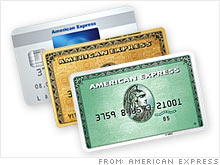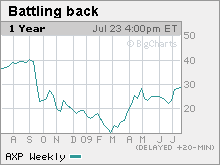AmEx profits nearly cut in half
Credit card giant reports big drop in earnings due to cost of paying back TARP loan, but results manage to beat analysts' expectations.
 |
| Weaker spending by cardholders and the company's decision to repay TARP funds weighed on AmEx's results in the latest quarter. |
 |
| American Express shares have recovered nicely in recent months, despite the painful selloff experienced this past spring. |
NEW YORK (CNNMoney.com) -- Profits at American Express were nearly cut in half in the latest quarter as the credit card giant moved to pay back the loan it received from the government's financial sector bailout.
The New York City-based company said it earned $337 million in the second quarter, or 9 cents a share, down 48% from $660 million during the same period a year ago.
Excluding costs related to its purchase of the preferred shares the government invested in the company last year as part of the Troubled Asset Relief Program, or TARP, AmEx said it would have earned 27 cents a share during the quarter.
That was a touch better than expected, as consensus estimates were for the firm to post a profit of 26 cents a share, excluding the TARP payback costs, according to Thomson Reuters.
Shares of American Express (AXP, Fortune 500) shares fell more than 4% in after-hours trading, however, after ending higher during the regular session.
Nowhere has the recession been felt more acutely than among credit card issuers. With unemployment on the rise, consumers have failed to stay current on their bills or have cut down on spending altogether.
Both trends persisted in the latest quarter for AmEx, as total spending by AmEx customers declined by 15% to $2.7 billion from $3.2 billion a year ago. The company, however, attributed the drop in spending to it having canceled roughly 2.7 million cards which it considered inactive during the quarter.
Still, the percentage of loans considered uncollectable continued to rise, particularly in its domestic card business, climbing to 10% from 8.5% in the previous quarter.
AmEx posted particularly weak results in its domestic credit card business, which swung to a loss of $200 million during the quarter.
Still, management noted that there were some encouraging signs in the latest quarter, including a lower-than-expected number of consumer bankruptcies.
"Just as in prior recessions, our aim is to be in position to gain competitive advantage once the economy begins to improve," Kenneth Chenault, AmEx's chairman and chief officer, said in a statement.
Many have viewed AmEx, which both issues cards directly to consumers and making money from its retailer card network, as a proxy for the broader credit card industry.
But unlike several of its peers in the financial services industry, the company has managed to stay profitable despite the severe downturn in the nation's economy.
On Thursday, rival Capital One (COF, Fortune 500) reported a loss for the second quarter, due in part to its decision to return $3.55 billion in TARP funds it received last fall.
Under the program, American Express received $3.39 billion, only to pay it back in June alongside other leading financial firms such as JPMorgan Chase (JPM, Fortune 500) and Goldman Sachs (GS, Fortune 500). ![]()

